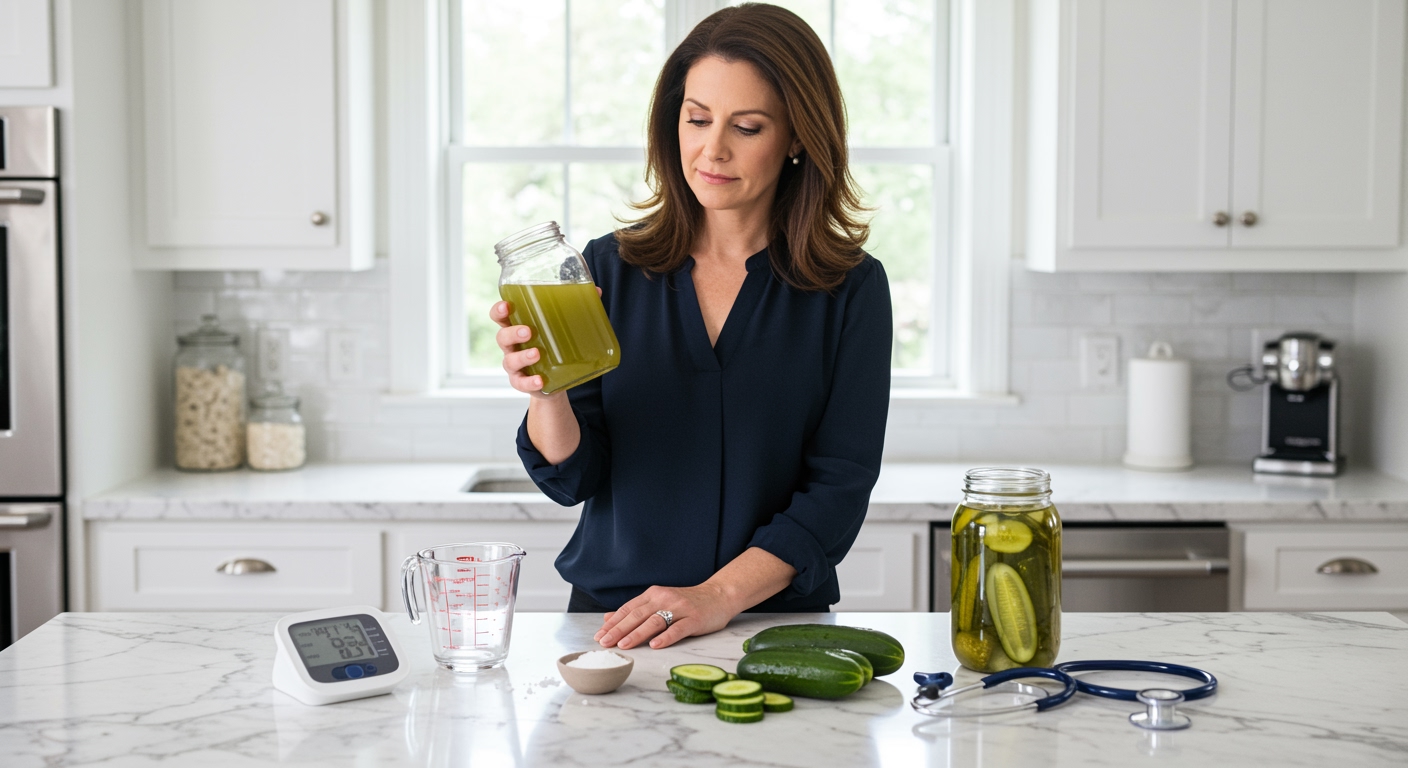✪ Key Takeaway: Pickle juice is not good for blood pressure due to its extremely high sodium content that can worsen hypertension.
Introduction
Your friend just told you that pickle juice cured their high blood pressure.
You might be wondering if this tangy liquid sitting in your refrigerator could actually help lower your numbers on the blood pressure monitor.
Hi, I’m Abdur, your nutrition coach and today I’m going to explain the real relationship between pickle juice and blood pressure so you can make an informed decision about your health.
What Makes Pickle Juice So Salty?
Pickle juice contains an enormous amount of sodium chloride because salt is the primary preservative used in the pickling process.
One cup of pickle juice delivers approximately 1,100 milligrams of sodium, which represents nearly half of your entire daily sodium limit.
The American Heart Association recommends consuming no more than 2,300 milligrams of sodium per day for most adults.
People with high blood pressure should aim for even less, around 1,500 milligrams daily to help manage their condition effectively.
This means just one cup of pickle juice would exceed your entire daily sodium allowance if you have hypertension.
✪ Fact: Pickle juice contains more sodium per serving than most processed snack foods and fast food meals.
How Does Sodium Affect Your Blood Pressure?
When you consume excess sodium, your kidneys struggle to filter it out of your bloodstream efficiently.
Your body responds by retaining more water to dilute the sodium concentration in your blood.
This extra fluid increases your total blood volume, which forces your heart to pump harder against the walls of your arteries.
The increased pressure against your arterial walls is what we measure as high blood pressure or hypertension.
Over time, this constant pressure damages your arteries and increases your risk of heart disease, stroke, and kidney problems.
Research consistently shows that reducing sodium intake helps lower blood pressure in most people, especially those already diagnosed with hypertension.
✪ Pro Tip: Even people without high blood pressure can benefit from limiting sodium to prevent future cardiovascular problems.
Why Do Some People Think Pickle Juice Helps?
The confusion about pickle juice and blood pressure likely stems from its electrolyte content and its use by athletes.
Pickle juice contains small amounts of potassium and magnesium, which are minerals that can help regulate blood pressure when consumed in adequate amounts.
However, the tiny amounts of these beneficial minerals are completely overshadowed by the massive sodium content.
Athletes sometimes drink pickle juice to prevent muscle cramps during intense exercise, but this practice is specifically for people who have lost significant sodium through sweating.
Some people mistakenly believe that because pickle juice helps with cramps, it must be good for overall cardiovascular health.
The reality is that what works for an athlete losing sodium through heavy sweating can be harmful for someone with high blood pressure sitting at home.
✪ Note: Context matters tremendously when evaluating whether any food or drink is beneficial for your specific health condition.
What Should You Drink Instead?
If you want to support healthy blood pressure, focus on beverages that provide beneficial nutrients without excessive sodium.
Plain water remains the best choice for staying hydrated without adding any unnecessary sodium to your diet.
Unsweetened green tea contains compounds called catechins that may help relax blood vessels and support healthy circulation.
Low-sodium vegetable juices can provide potassium and other minerals that help counteract sodium effects on blood pressure.
Beet juice has shown promise in research studies for its natural nitrates, which can help blood vessels relax and improve blood flow.
Hibiscus tea has been studied for its potential to help lower blood pressure naturally when consumed regularly as part of a healthy diet.
✪ Pro Tip: Read labels carefully because even healthy-sounding drinks can contain hidden sodium that adds up quickly throughout the day.
The Bottom Line
Pickle juice is not good for blood pressure because its extremely high sodium content can worsen hypertension and increase cardiovascular risks.
When it comes to blood pressure, the solution is rarely found in a jar but rather in consistent daily choices that support your long-term health.
I would love to hear about your experience with managing blood pressure through dietary changes, so please share your questions or thoughts in the comments below.
References
At NutritionCrown, we use quality and credible sources to ensure our content is accurate and trustworthy. Below are the sources referenced in creating this article:
- PMC: Sodium Intake and Hypertension
- PMC: Dietary Approaches to Stop Hypertension
- WebMD: Is Pickle Juice Good for You
- Cleveland Clinic: Are Pickles Good for You





